The Relationship Between Tourism and Crime Rates in African Nations
VerifiedAdded on 2023/03/29
|6
|1580
|331
Essay
AI Summary
This essay examines the complex relationship between tourism and crime in Africa, with a specific focus on South Africa and Nigeria. It highlights how high crime rates, including violent crimes, theft, and online scams, significantly deter tourists and negatively impact tourism revenue in both countries. The essay references data indicating that while the global tourism industry is growing, South Africa's growth is hampered by rising crime, and Nigeria suffers from low tourist footfall due to safety concerns, exacerbated by terrorist activities. It emphasizes the urgent need for government intervention to curb crime and ensure tourist safety to protect the tourism industry's economic contributions. The essay also cites various studies that focus on the challenges and prospects of sustainable tourism in the face of crime in Africa.
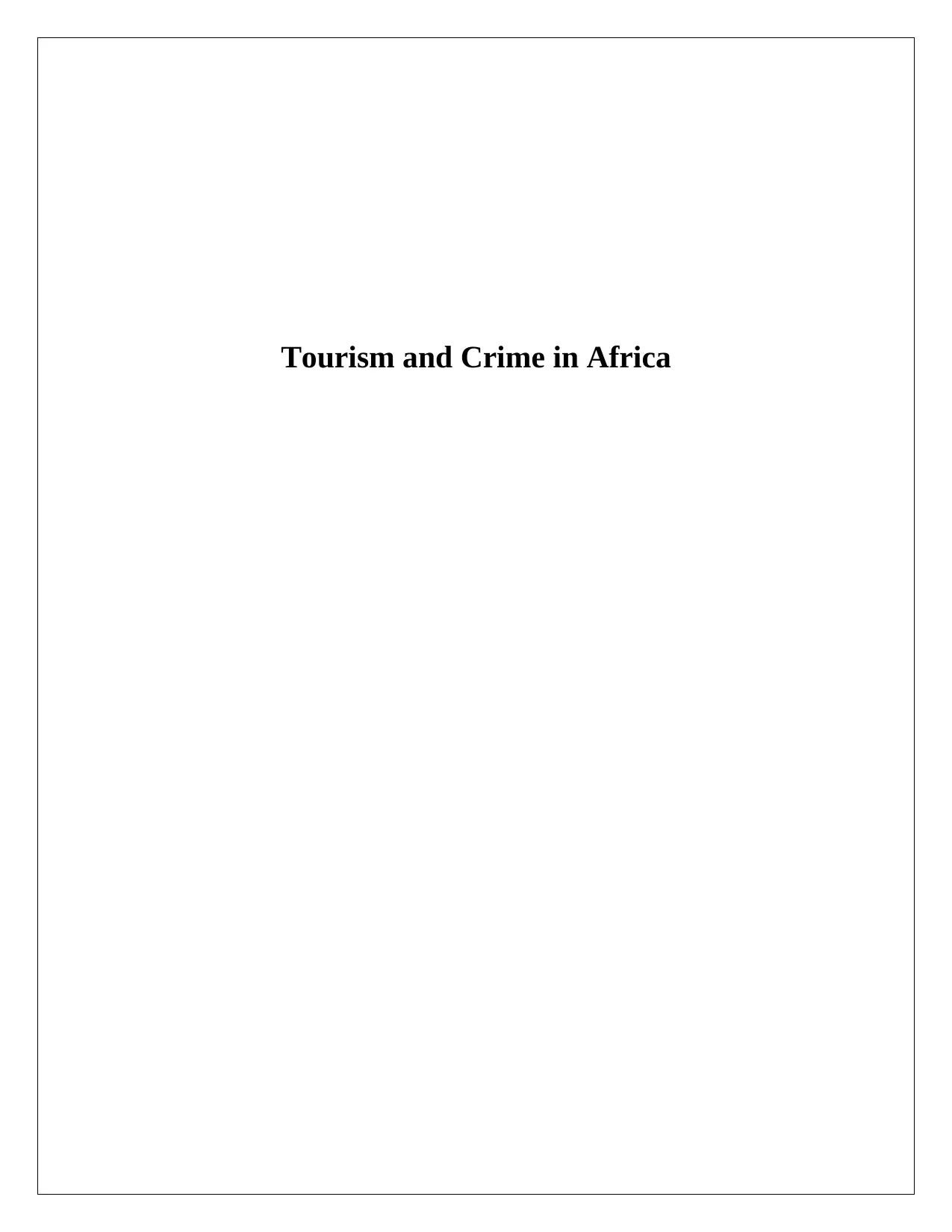
Tourism and Crime in Africa
Paraphrase This Document
Need a fresh take? Get an instant paraphrase of this document with our AI Paraphraser
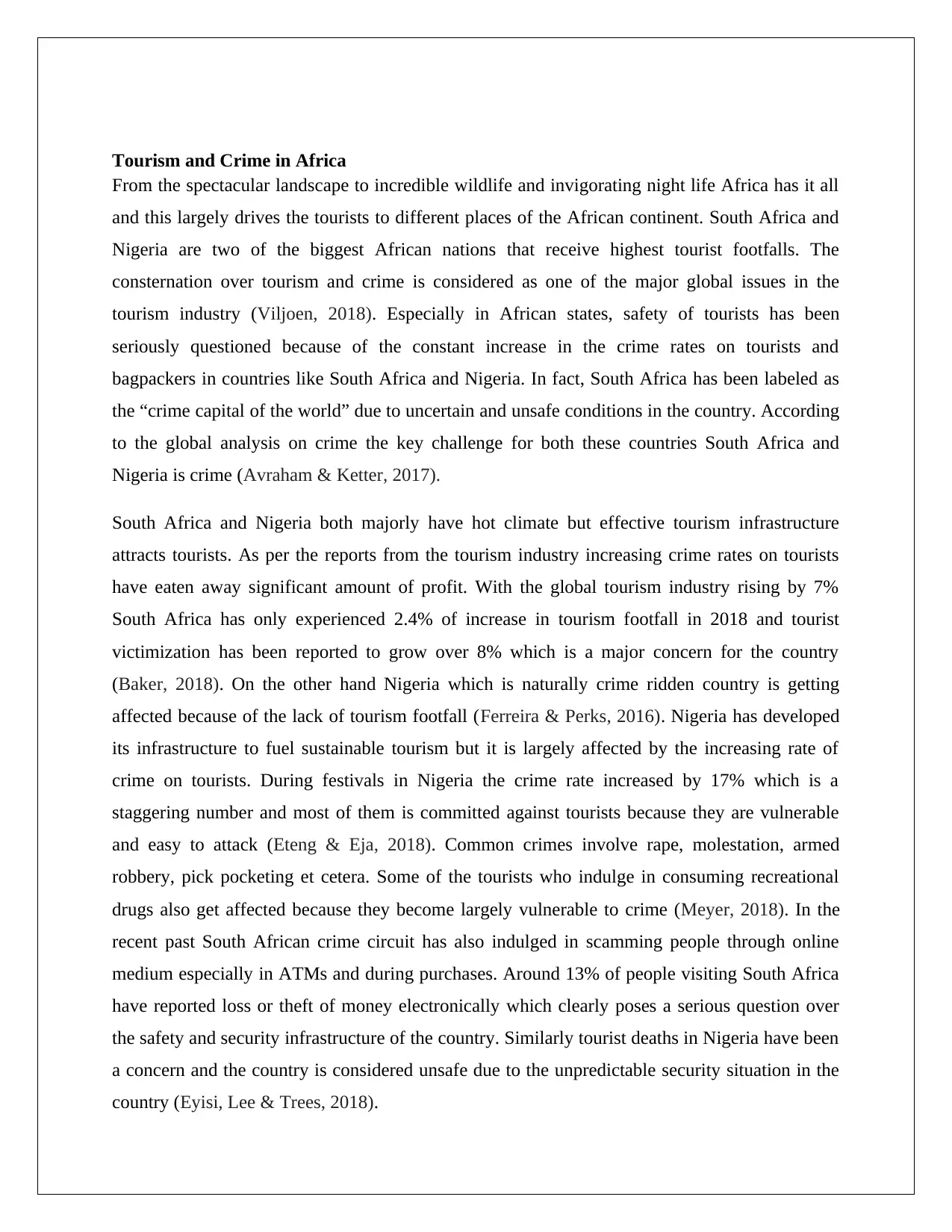
Tourism and Crime in Africa
From the spectacular landscape to incredible wildlife and invigorating night life Africa has it all
and this largely drives the tourists to different places of the African continent. South Africa and
Nigeria are two of the biggest African nations that receive highest tourist footfalls. The
consternation over tourism and crime is considered as one of the major global issues in the
tourism industry (Viljoen, 2018). Especially in African states, safety of tourists has been
seriously questioned because of the constant increase in the crime rates on tourists and
bagpackers in countries like South Africa and Nigeria. In fact, South Africa has been labeled as
the “crime capital of the world” due to uncertain and unsafe conditions in the country. According
to the global analysis on crime the key challenge for both these countries South Africa and
Nigeria is crime (Avraham & Ketter, 2017).
South Africa and Nigeria both majorly have hot climate but effective tourism infrastructure
attracts tourists. As per the reports from the tourism industry increasing crime rates on tourists
have eaten away significant amount of profit. With the global tourism industry rising by 7%
South Africa has only experienced 2.4% of increase in tourism footfall in 2018 and tourist
victimization has been reported to grow over 8% which is a major concern for the country
(Baker, 2018). On the other hand Nigeria which is naturally crime ridden country is getting
affected because of the lack of tourism footfall (Ferreira & Perks, 2016). Nigeria has developed
its infrastructure to fuel sustainable tourism but it is largely affected by the increasing rate of
crime on tourists. During festivals in Nigeria the crime rate increased by 17% which is a
staggering number and most of them is committed against tourists because they are vulnerable
and easy to attack (Eteng & Eja, 2018). Common crimes involve rape, molestation, armed
robbery, pick pocketing et cetera. Some of the tourists who indulge in consuming recreational
drugs also get affected because they become largely vulnerable to crime (Meyer, 2018). In the
recent past South African crime circuit has also indulged in scamming people through online
medium especially in ATMs and during purchases. Around 13% of people visiting South Africa
have reported loss or theft of money electronically which clearly poses a serious question over
the safety and security infrastructure of the country. Similarly tourist deaths in Nigeria have been
a concern and the country is considered unsafe due to the unpredictable security situation in the
country (Eyisi, Lee & Trees, 2018).
From the spectacular landscape to incredible wildlife and invigorating night life Africa has it all
and this largely drives the tourists to different places of the African continent. South Africa and
Nigeria are two of the biggest African nations that receive highest tourist footfalls. The
consternation over tourism and crime is considered as one of the major global issues in the
tourism industry (Viljoen, 2018). Especially in African states, safety of tourists has been
seriously questioned because of the constant increase in the crime rates on tourists and
bagpackers in countries like South Africa and Nigeria. In fact, South Africa has been labeled as
the “crime capital of the world” due to uncertain and unsafe conditions in the country. According
to the global analysis on crime the key challenge for both these countries South Africa and
Nigeria is crime (Avraham & Ketter, 2017).
South Africa and Nigeria both majorly have hot climate but effective tourism infrastructure
attracts tourists. As per the reports from the tourism industry increasing crime rates on tourists
have eaten away significant amount of profit. With the global tourism industry rising by 7%
South Africa has only experienced 2.4% of increase in tourism footfall in 2018 and tourist
victimization has been reported to grow over 8% which is a major concern for the country
(Baker, 2018). On the other hand Nigeria which is naturally crime ridden country is getting
affected because of the lack of tourism footfall (Ferreira & Perks, 2016). Nigeria has developed
its infrastructure to fuel sustainable tourism but it is largely affected by the increasing rate of
crime on tourists. During festivals in Nigeria the crime rate increased by 17% which is a
staggering number and most of them is committed against tourists because they are vulnerable
and easy to attack (Eteng & Eja, 2018). Common crimes involve rape, molestation, armed
robbery, pick pocketing et cetera. Some of the tourists who indulge in consuming recreational
drugs also get affected because they become largely vulnerable to crime (Meyer, 2018). In the
recent past South African crime circuit has also indulged in scamming people through online
medium especially in ATMs and during purchases. Around 13% of people visiting South Africa
have reported loss or theft of money electronically which clearly poses a serious question over
the safety and security infrastructure of the country. Similarly tourist deaths in Nigeria have been
a concern and the country is considered unsafe due to the unpredictable security situation in the
country (Eyisi, Lee & Trees, 2018).
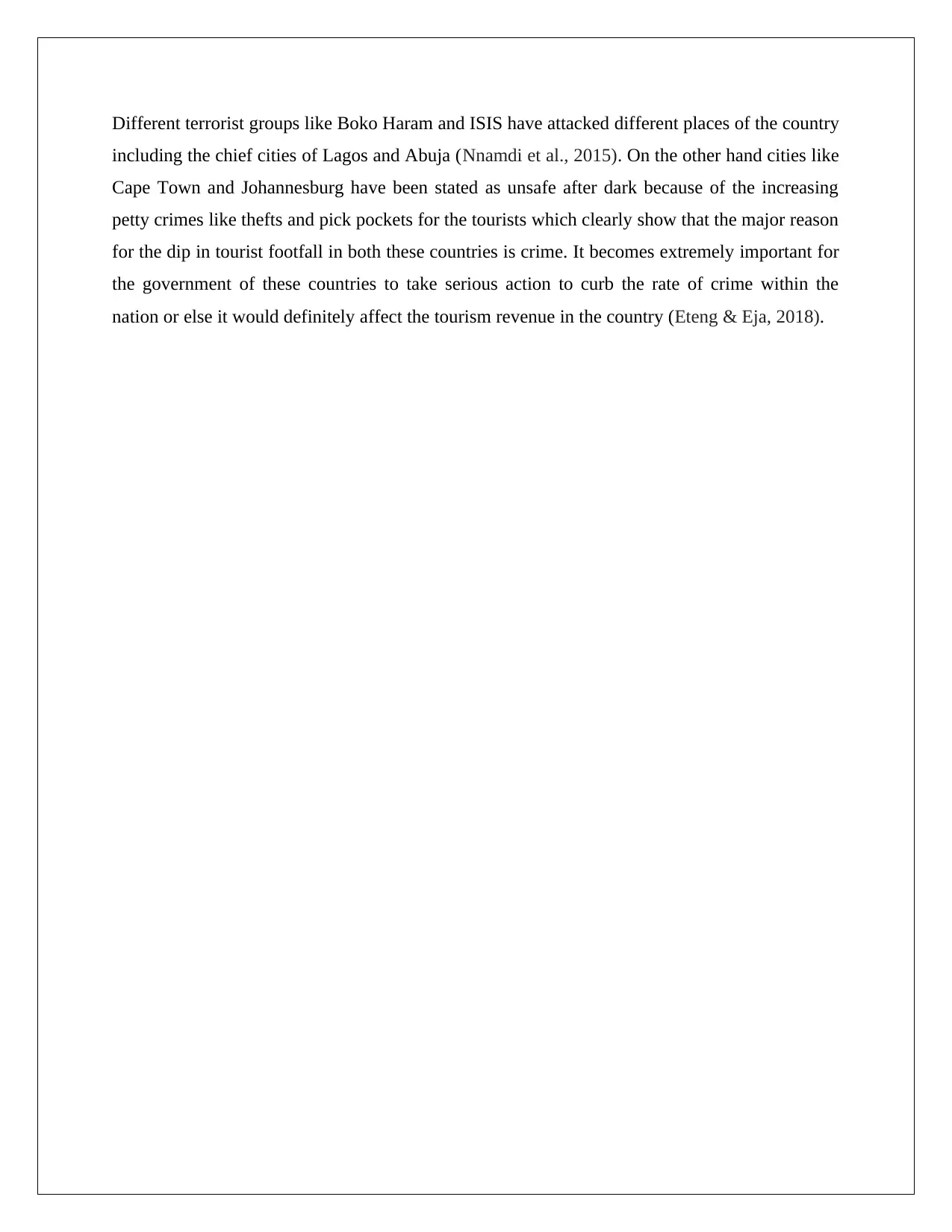
Different terrorist groups like Boko Haram and ISIS have attacked different places of the country
including the chief cities of Lagos and Abuja (Nnamdi et al., 2015). On the other hand cities like
Cape Town and Johannesburg have been stated as unsafe after dark because of the increasing
petty crimes like thefts and pick pockets for the tourists which clearly show that the major reason
for the dip in tourist footfall in both these countries is crime. It becomes extremely important for
the government of these countries to take serious action to curb the rate of crime within the
nation or else it would definitely affect the tourism revenue in the country (Eteng & Eja, 2018).
including the chief cities of Lagos and Abuja (Nnamdi et al., 2015). On the other hand cities like
Cape Town and Johannesburg have been stated as unsafe after dark because of the increasing
petty crimes like thefts and pick pockets for the tourists which clearly show that the major reason
for the dip in tourist footfall in both these countries is crime. It becomes extremely important for
the government of these countries to take serious action to curb the rate of crime within the
nation or else it would definitely affect the tourism revenue in the country (Eteng & Eja, 2018).
⊘ This is a preview!⊘
Do you want full access?
Subscribe today to unlock all pages.

Trusted by 1+ million students worldwide
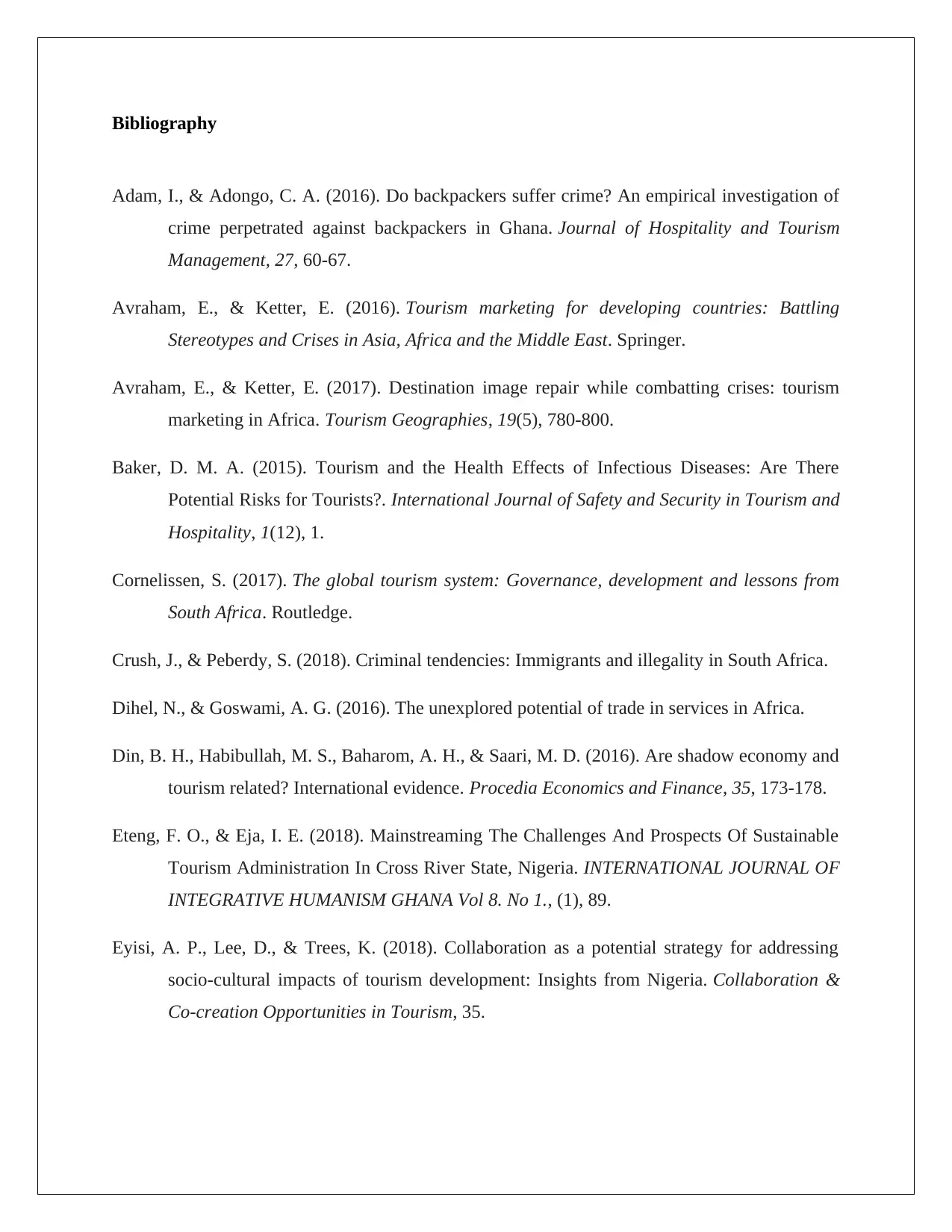
Bibliography
Adam, I., & Adongo, C. A. (2016). Do backpackers suffer crime? An empirical investigation of
crime perpetrated against backpackers in Ghana. Journal of Hospitality and Tourism
Management, 27, 60-67.
Avraham, E., & Ketter, E. (2016). Tourism marketing for developing countries: Battling
Stereotypes and Crises in Asia, Africa and the Middle East. Springer.
Avraham, E., & Ketter, E. (2017). Destination image repair while combatting crises: tourism
marketing in Africa. Tourism Geographies, 19(5), 780-800.
Baker, D. M. A. (2015). Tourism and the Health Effects of Infectious Diseases: Are There
Potential Risks for Tourists?. International Journal of Safety and Security in Tourism and
Hospitality, 1(12), 1.
Cornelissen, S. (2017). The global tourism system: Governance, development and lessons from
South Africa. Routledge.
Crush, J., & Peberdy, S. (2018). Criminal tendencies: Immigrants and illegality in South Africa.
Dihel, N., & Goswami, A. G. (2016). The unexplored potential of trade in services in Africa.
Din, B. H., Habibullah, M. S., Baharom, A. H., & Saari, M. D. (2016). Are shadow economy and
tourism related? International evidence. Procedia Economics and Finance, 35, 173-178.
Eteng, F. O., & Eja, I. E. (2018). Mainstreaming The Challenges And Prospects Of Sustainable
Tourism Administration In Cross River State, Nigeria. INTERNATIONAL JOURNAL OF
INTEGRATIVE HUMANISM GHANA Vol 8. No 1., (1), 89.
Eyisi, A. P., Lee, D., & Trees, K. (2018). Collaboration as a potential strategy for addressing
socio-cultural impacts of tourism development: Insights from Nigeria. Collaboration &
Co-creation Opportunities in Tourism, 35.
Adam, I., & Adongo, C. A. (2016). Do backpackers suffer crime? An empirical investigation of
crime perpetrated against backpackers in Ghana. Journal of Hospitality and Tourism
Management, 27, 60-67.
Avraham, E., & Ketter, E. (2016). Tourism marketing for developing countries: Battling
Stereotypes and Crises in Asia, Africa and the Middle East. Springer.
Avraham, E., & Ketter, E. (2017). Destination image repair while combatting crises: tourism
marketing in Africa. Tourism Geographies, 19(5), 780-800.
Baker, D. M. A. (2015). Tourism and the Health Effects of Infectious Diseases: Are There
Potential Risks for Tourists?. International Journal of Safety and Security in Tourism and
Hospitality, 1(12), 1.
Cornelissen, S. (2017). The global tourism system: Governance, development and lessons from
South Africa. Routledge.
Crush, J., & Peberdy, S. (2018). Criminal tendencies: Immigrants and illegality in South Africa.
Dihel, N., & Goswami, A. G. (2016). The unexplored potential of trade in services in Africa.
Din, B. H., Habibullah, M. S., Baharom, A. H., & Saari, M. D. (2016). Are shadow economy and
tourism related? International evidence. Procedia Economics and Finance, 35, 173-178.
Eteng, F. O., & Eja, I. E. (2018). Mainstreaming The Challenges And Prospects Of Sustainable
Tourism Administration In Cross River State, Nigeria. INTERNATIONAL JOURNAL OF
INTEGRATIVE HUMANISM GHANA Vol 8. No 1., (1), 89.
Eyisi, A. P., Lee, D., & Trees, K. (2018). Collaboration as a potential strategy for addressing
socio-cultural impacts of tourism development: Insights from Nigeria. Collaboration &
Co-creation Opportunities in Tourism, 35.
Paraphrase This Document
Need a fresh take? Get an instant paraphrase of this document with our AI Paraphraser
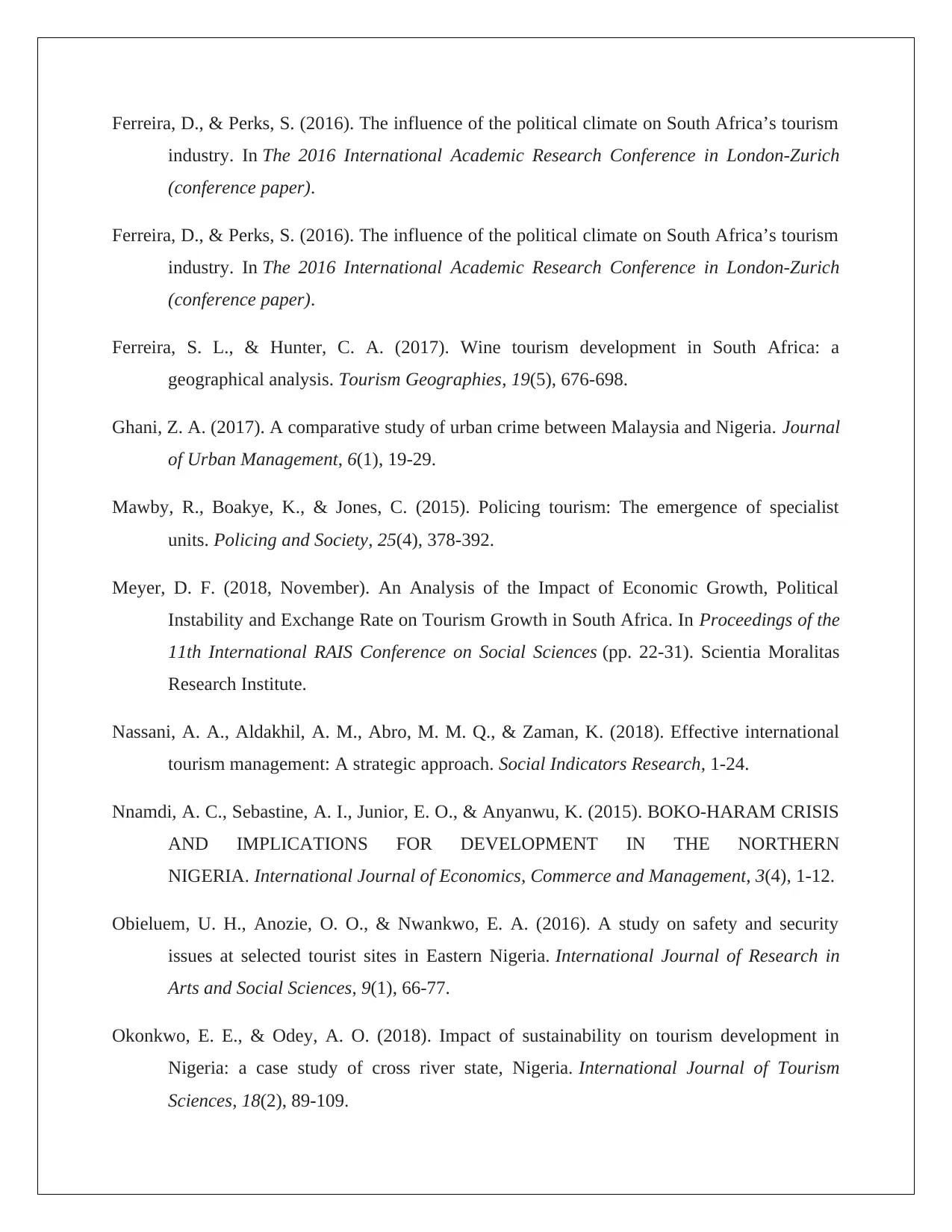
Ferreira, D., & Perks, S. (2016). The influence of the political climate on South Africa’s tourism
industry. In The 2016 International Academic Research Conference in London-Zurich
(conference paper).
Ferreira, D., & Perks, S. (2016). The influence of the political climate on South Africa’s tourism
industry. In The 2016 International Academic Research Conference in London-Zurich
(conference paper).
Ferreira, S. L., & Hunter, C. A. (2017). Wine tourism development in South Africa: a
geographical analysis. Tourism Geographies, 19(5), 676-698.
Ghani, Z. A. (2017). A comparative study of urban crime between Malaysia and Nigeria. Journal
of Urban Management, 6(1), 19-29.
Mawby, R., Boakye, K., & Jones, C. (2015). Policing tourism: The emergence of specialist
units. Policing and Society, 25(4), 378-392.
Meyer, D. F. (2018, November). An Analysis of the Impact of Economic Growth, Political
Instability and Exchange Rate on Tourism Growth in South Africa. In Proceedings of the
11th International RAIS Conference on Social Sciences (pp. 22-31). Scientia Moralitas
Research Institute.
Nassani, A. A., Aldakhil, A. M., Abro, M. M. Q., & Zaman, K. (2018). Effective international
tourism management: A strategic approach. Social Indicators Research, 1-24.
Nnamdi, A. C., Sebastine, A. I., Junior, E. O., & Anyanwu, K. (2015). BOKO-HARAM CRISIS
AND IMPLICATIONS FOR DEVELOPMENT IN THE NORTHERN
NIGERIA. International Journal of Economics, Commerce and Management, 3(4), 1-12.
Obieluem, U. H., Anozie, O. O., & Nwankwo, E. A. (2016). A study on safety and security
issues at selected tourist sites in Eastern Nigeria. International Journal of Research in
Arts and Social Sciences, 9(1), 66-77.
Okonkwo, E. E., & Odey, A. O. (2018). Impact of sustainability on tourism development in
Nigeria: a case study of cross river state, Nigeria. International Journal of Tourism
Sciences, 18(2), 89-109.
industry. In The 2016 International Academic Research Conference in London-Zurich
(conference paper).
Ferreira, D., & Perks, S. (2016). The influence of the political climate on South Africa’s tourism
industry. In The 2016 International Academic Research Conference in London-Zurich
(conference paper).
Ferreira, S. L., & Hunter, C. A. (2017). Wine tourism development in South Africa: a
geographical analysis. Tourism Geographies, 19(5), 676-698.
Ghani, Z. A. (2017). A comparative study of urban crime between Malaysia and Nigeria. Journal
of Urban Management, 6(1), 19-29.
Mawby, R., Boakye, K., & Jones, C. (2015). Policing tourism: The emergence of specialist
units. Policing and Society, 25(4), 378-392.
Meyer, D. F. (2018, November). An Analysis of the Impact of Economic Growth, Political
Instability and Exchange Rate on Tourism Growth in South Africa. In Proceedings of the
11th International RAIS Conference on Social Sciences (pp. 22-31). Scientia Moralitas
Research Institute.
Nassani, A. A., Aldakhil, A. M., Abro, M. M. Q., & Zaman, K. (2018). Effective international
tourism management: A strategic approach. Social Indicators Research, 1-24.
Nnamdi, A. C., Sebastine, A. I., Junior, E. O., & Anyanwu, K. (2015). BOKO-HARAM CRISIS
AND IMPLICATIONS FOR DEVELOPMENT IN THE NORTHERN
NIGERIA. International Journal of Economics, Commerce and Management, 3(4), 1-12.
Obieluem, U. H., Anozie, O. O., & Nwankwo, E. A. (2016). A study on safety and security
issues at selected tourist sites in Eastern Nigeria. International Journal of Research in
Arts and Social Sciences, 9(1), 66-77.
Okonkwo, E. E., & Odey, A. O. (2018). Impact of sustainability on tourism development in
Nigeria: a case study of cross river state, Nigeria. International Journal of Tourism
Sciences, 18(2), 89-109.
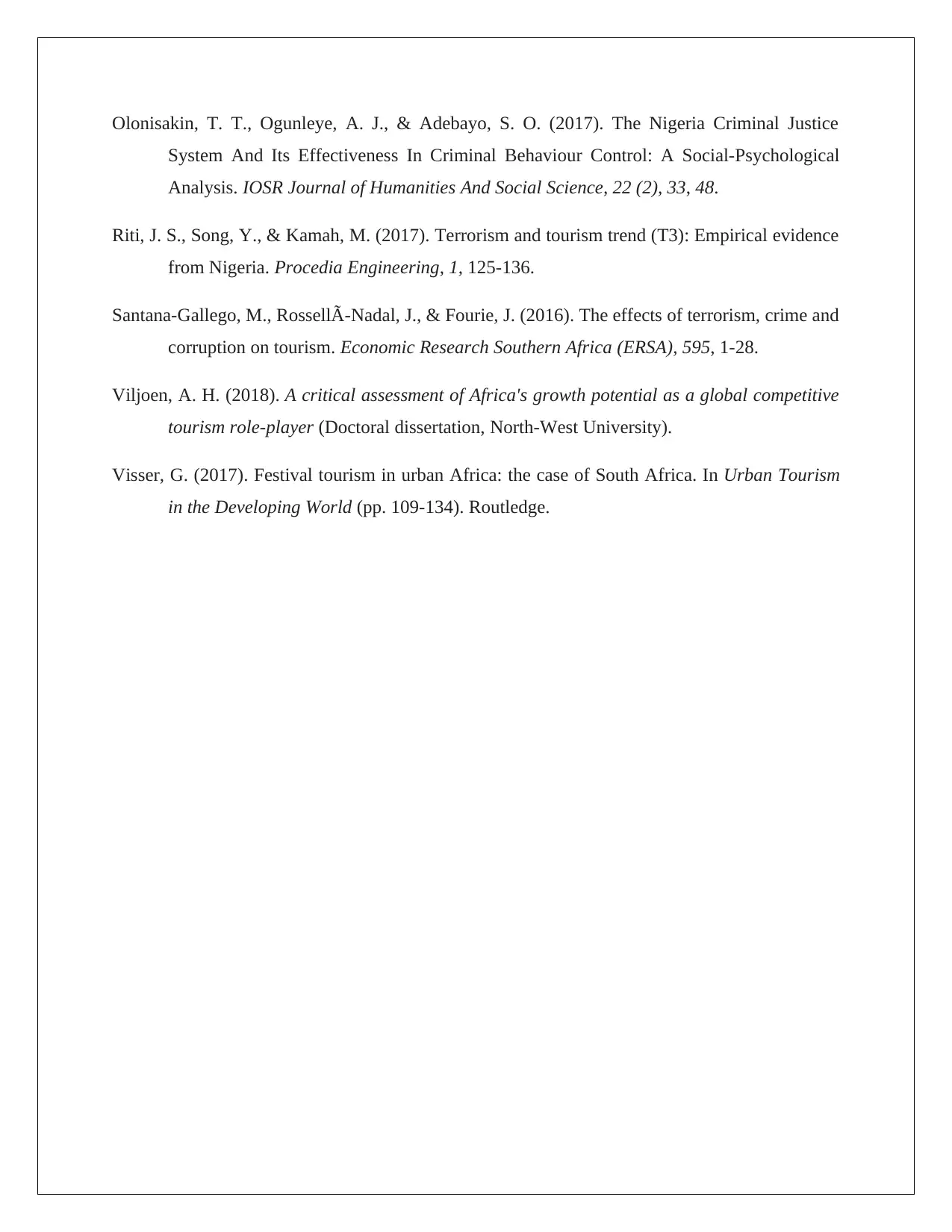
Olonisakin, T. T., Ogunleye, A. J., & Adebayo, S. O. (2017). The Nigeria Criminal Justice
System And Its Effectiveness In Criminal Behaviour Control: A Social-Psychological
Analysis. IOSR Journal of Humanities And Social Science, 22 (2), 33, 48.
Riti, J. S., Song, Y., & Kamah, M. (2017). Terrorism and tourism trend (T3): Empirical evidence
from Nigeria. Procedia Engineering, 1, 125-136.
Santana-Gallego, M., RossellÃ-Nadal, J., & Fourie, J. (2016). The effects of terrorism, crime and
corruption on tourism. Economic Research Southern Africa (ERSA), 595, 1-28.
Viljoen, A. H. (2018). A critical assessment of Africa's growth potential as a global competitive
tourism role-player (Doctoral dissertation, North-West University).
Visser, G. (2017). Festival tourism in urban Africa: the case of South Africa. In Urban Tourism
in the Developing World (pp. 109-134). Routledge.
System And Its Effectiveness In Criminal Behaviour Control: A Social-Psychological
Analysis. IOSR Journal of Humanities And Social Science, 22 (2), 33, 48.
Riti, J. S., Song, Y., & Kamah, M. (2017). Terrorism and tourism trend (T3): Empirical evidence
from Nigeria. Procedia Engineering, 1, 125-136.
Santana-Gallego, M., RossellÃ-Nadal, J., & Fourie, J. (2016). The effects of terrorism, crime and
corruption on tourism. Economic Research Southern Africa (ERSA), 595, 1-28.
Viljoen, A. H. (2018). A critical assessment of Africa's growth potential as a global competitive
tourism role-player (Doctoral dissertation, North-West University).
Visser, G. (2017). Festival tourism in urban Africa: the case of South Africa. In Urban Tourism
in the Developing World (pp. 109-134). Routledge.
⊘ This is a preview!⊘
Do you want full access?
Subscribe today to unlock all pages.

Trusted by 1+ million students worldwide
1 out of 6
Related Documents
Your All-in-One AI-Powered Toolkit for Academic Success.
+13062052269
info@desklib.com
Available 24*7 on WhatsApp / Email
![[object Object]](/_next/static/media/star-bottom.7253800d.svg)
Unlock your academic potential
Copyright © 2020–2026 A2Z Services. All Rights Reserved. Developed and managed by ZUCOL.





